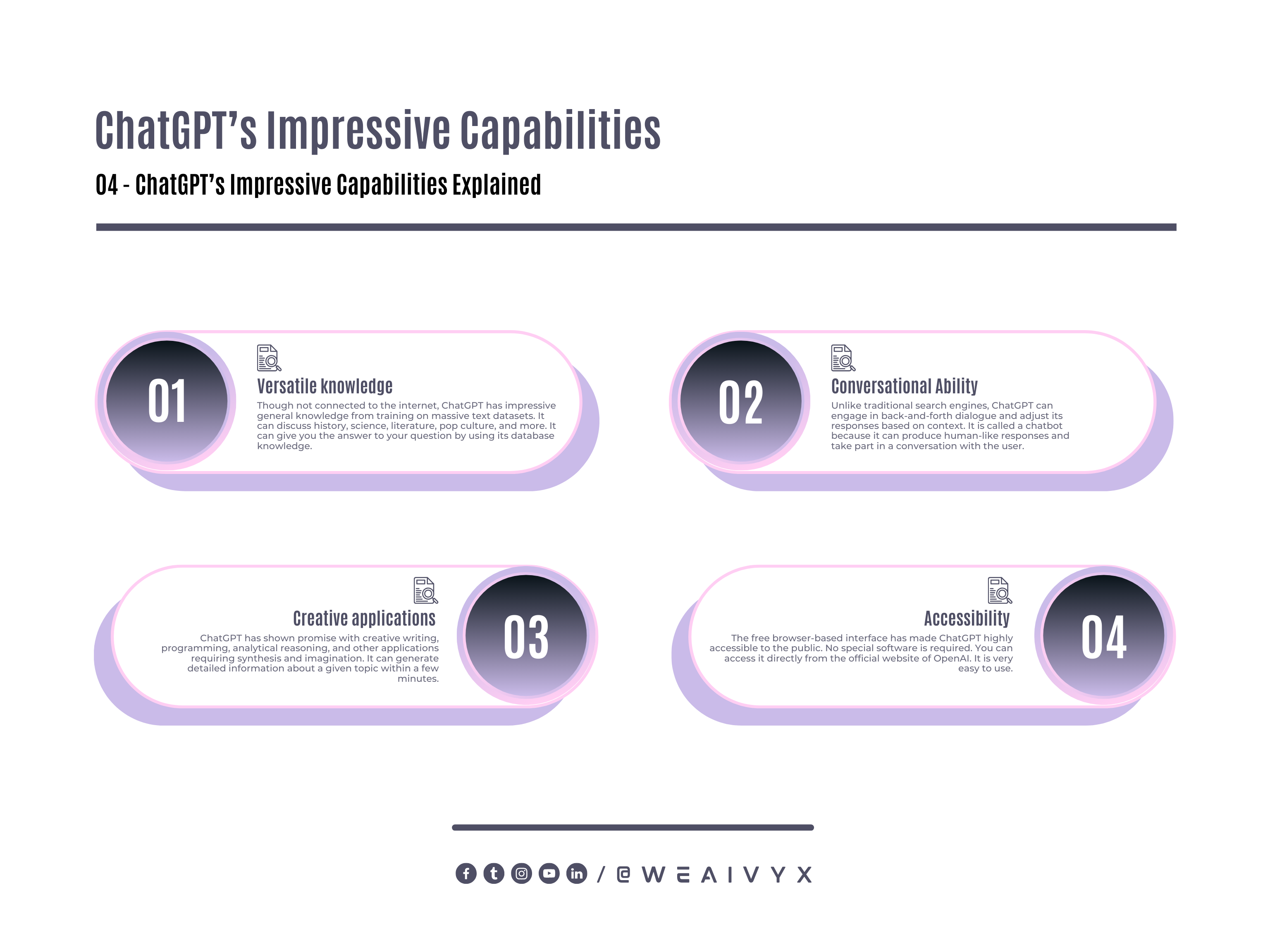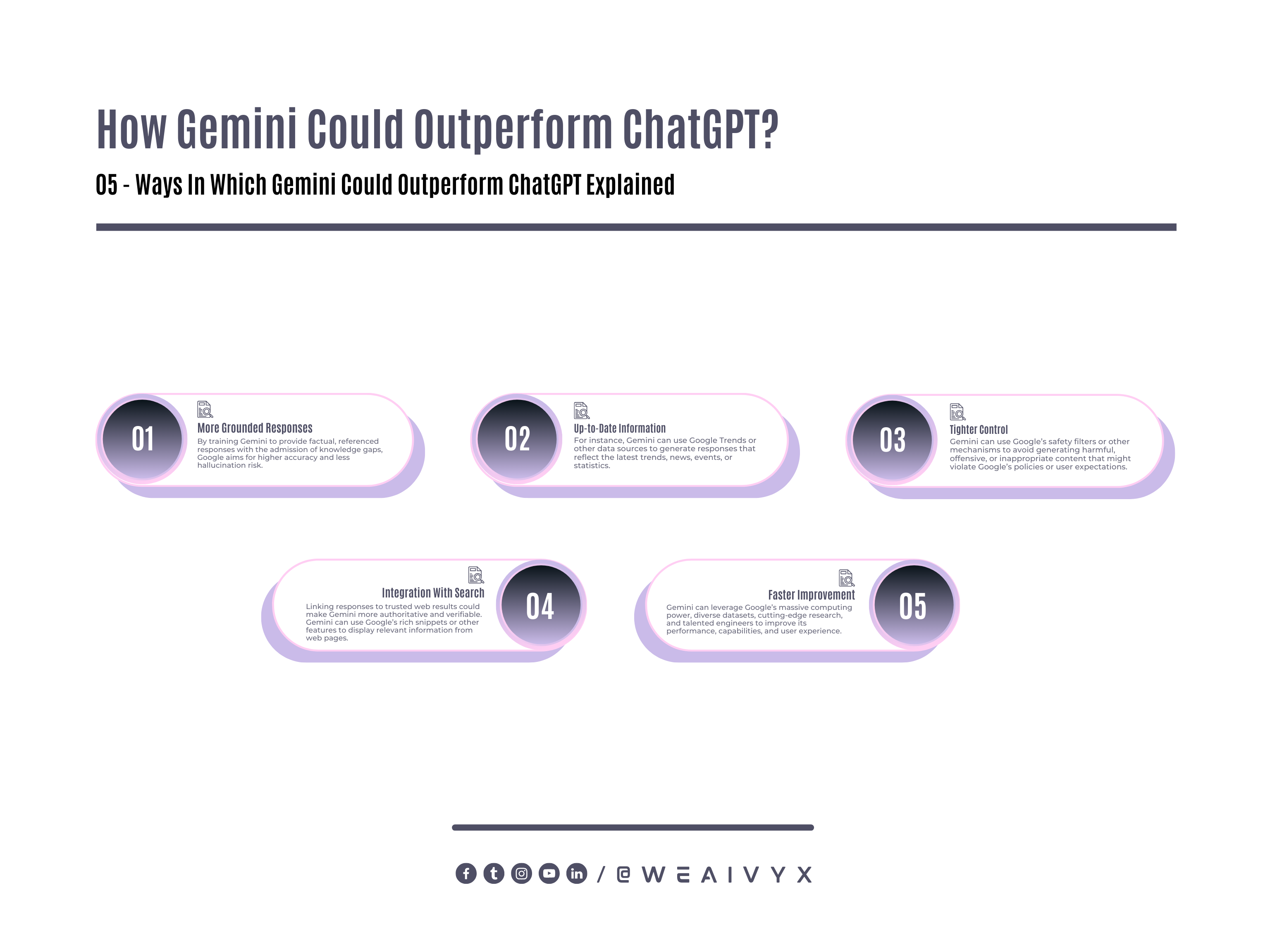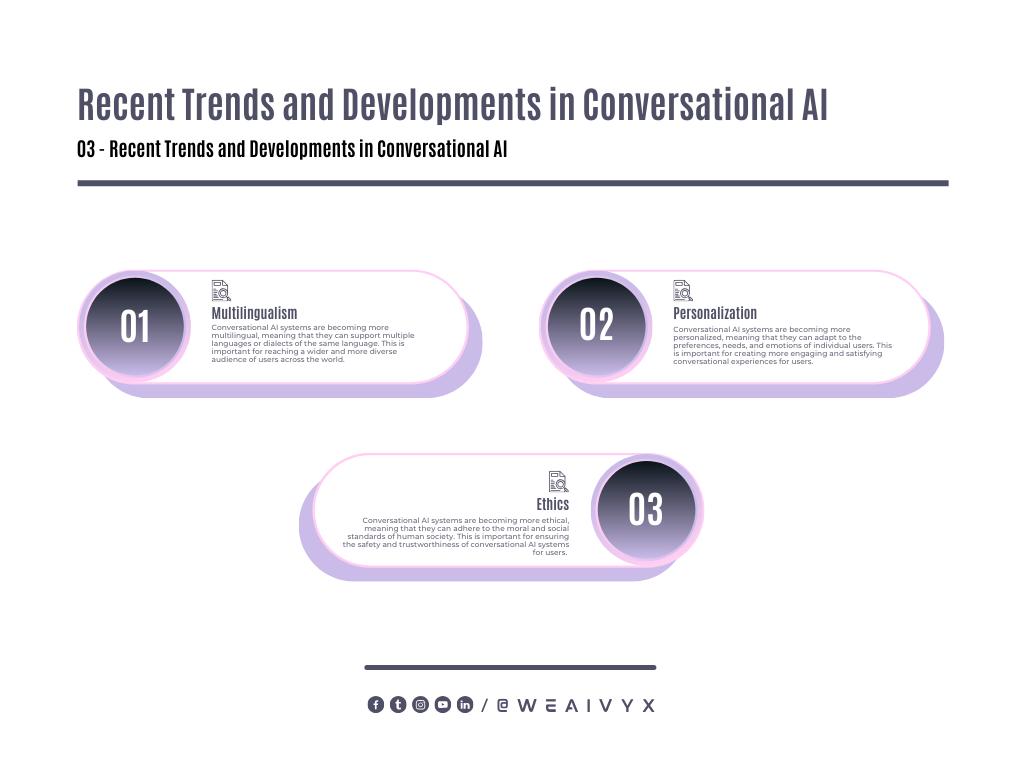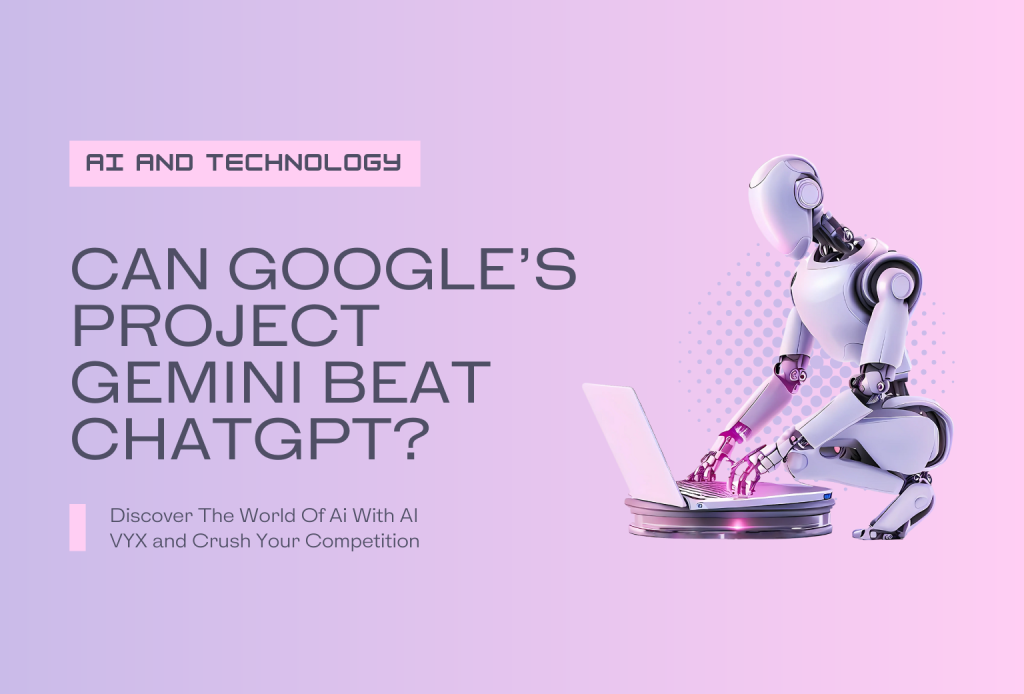Conversational AI is a rapidly evolving field that aims to create natural and engaging interactions between humans and machines using natural language.
We will compare and contrast these two conversational AI systems based on their features, strengths, weaknesses, and potential applications.
We will also discuss some of the recent trends and developments in conversational AI that might shape the future of this field.
Conversational AI
Conversational AI systems can take various forms, such as chatbots, voice assistants, virtual agents, and conversational search engines.
These systems can provide various benefits for users and businesses, such as enhancing customer service, improving productivity, increasing accessibility, and generating insights.
However, conversational AI also faces many challenges and limitations, such as understanding human language, handling complex requests, integrating with different platforms and systems, ensuring user satisfaction and trust, and maintaining ethical and social standards.
Therefore, conversational AI developers and researchers are constantly striving to overcome these challenges and improve the performance and capabilities of their systems.
Two of the most prominent players in the conversational AI space are Google and OpenAI, who have both developed large-scale language models that can generate natural language responses based on user inputs.
Google’s Project Gemini is the successor of its PaLM 2 model, which powers many of its AI services, such as the Bard chatbot and Duet AI in Workspace apps.
OpenAI’s ChatGPT is a variant of its GPT-3 model, which is widely regarded as one of the most advanced language models in the world.
What is Project Gemini?
Google has launched the Project Gemini, a new family of large language models. They’ve also rebranded Google Bard as Google Gemini.
Project Gemini is Google’s next-generation AI architecture that will eventually replace PaLM 2. PaLM 2 is a large language model that was trained on a massive corpus of text from the internet, as well as domain-specific data from various sources.
PaLM 2 can generate natural language responses based on user inputs, as well as perform other tasks such as summarization, translation, sentiment analysis, and question answering.
Project Gemini is still in training mode and is expected to be a key rival to OpenAI’s GPT-3 once launched.
According to Google, Project Gemini was built with multimodal capabilities in mind, meaning that it can process and generate not only text but also images, audio, video, and other types of data.
This will allow for more diverse and rich conversational experiences for users across different platforms and devices.
Project Gemini will also be designed to accommodate future developments in conversational AI, such as improved memory and planning, context awareness, personalization, emotion recognition, and ethical reasoning.
Google hopes that Project Gemini will enable more natural, intelligent, and human-like conversations between users and machines.
Release Date of Google Gemini
Google Gemini is still in training mode and is expected to be a key rival to OpenAI’s GPT-4 once launched.
According to some reports, Google Gemini could be released for developers as soon as this fall and be integrated into several Google products for consumers.
However, Google has not officially announced the release date of Gemini or confirmed its features and capabilities.
Google started working on Gemini in early 2023, after seeing the success and popularity of OpenAI’s GPT-3 and ChatGPT models.
Google wanted to create a more general-purpose AI program that could combine conversational text with image generation and other types of data.
Google also wanted to make Gemini more future-proof, by designing it to accommodate future developments in conversational AI such as improved memory and planning, context awareness, personalization, emotion recognition, and ethical reasoning.
Google announced Gemini at its annual developer conference in May 2023, where it also unveiled some of the new features and applications powered by PaLM 2, such as Duet AI, Help Me Write, and new AI-integrated search.
Google also teased some of the potential use cases of Gemini, such as customer service, productivity, education, entertainment, research, and creativity.
Google also said that Gemini would be available in different sizes and with different capabilities, depending on the needs and preferences of developers and users.
How Does Project Gemini Work?
Google hasn’t revealed full details yet, but we know Project Gemini leverages LaMDA (Language Model for Dialogue Applications), Google’s internal conversational AI system. LaMDA has been trained on dialogue data to carry out natural conversations.
Gemini aims for responses that are grounded in facts, provide references, admit knowledge gaps, and reject inappropriate requests.
This could give it an edge over ChatGPT, which is known to sometimes generate convincing but false information.
What is ChatGPT?
ChatGPT is a conversational AI system developed by OpenAI that leverages its GPT-3 model to interact with users naturally.
GPT-3 is one of the largest and most powerful language models ever created, with 175 billion parameters and trained on a huge amount of text data from the internet.
GPT-3 can generate coherent and fluent text on almost any topic or domain based on user inputs or prompts.
ChatGPT is a variant of GPT-3 that was fine-tuned on a large dataset of human conversations collected from various sources such as Reddit, Twitter, Wikipedia, etc.
ChatGPT can handle different types of conversational scenarios such as casual chat, information-seeking, opinion-sharing, role-playing, and storytelling.
ChatGPT can also answer follow-up questions, admit its mistakes, challenge incorrect premises, and reject inappropriate requests.
ChatGPT was introduced by OpenAI in November 2022 as a research preview and is available for users to try online at chat.openai.com.
ChatGPT is also integrated with other platforms such as Discord, Slack, and Telegram.
ChatGPT aims to provide users with engaging and entertaining conversational experiences that showcase the capabilities of GPT-3.
ChatGPT’s Impressive Capabilities
ChatGPT stunned the public with its ability to mimic human responses on nearly any topic while avoiding obvious mistakes.
It can explain complex concepts, write stories and code, compose essays, solve math problems, and more.
Some key strengths:
Versatile knowledge
Though not connected to the internet, ChatGPT has impressive general knowledge from training on massive text datasets.
It can discuss history, science, literature, pop culture, and more. It can give you the answer to your question by using its database knowledge.
Conversational ability
Unlike traditional search engines, ChatGPT can engage in back-and-forth dialogue and adjust its responses based on context.
It is called a chatbot because it can produce human-like responses and take part in a conversation with the user.
Creative applications
ChatGPT has shown promise with creative writing, programming, analytical reasoning, and other applications requiring synthesis and imagination. It can generate detailed information about a given topic within a few minutes.
Accessibility
The free browser-based interface has made ChatGPT highly accessible to the public. No special software is required. You can access it directly from the official website of OpenAI. It is very easy to use.

How Do They Compare?
Project Gemini and ChatGPT are both state-of-the-art conversational AI systems that are based on large-scale language models trained on massive amounts of data.
However, they also have some notable differences in terms of their features, strengths, weaknesses, and potential applications.
Features
Project Gemini has the following features:
Multimodal: It can process and generate not only text but also images, audio, video, and other types of data. You can easily generate different types of content using Gemini which is a new feature as compared to ChatGPT.
Future-proof: It is designed to accommodate future developments in conversational AI such as improved memory and planning, context-awareness, personalization, emotion recognition, and ethical reasoning.
Integrated: It is integrated with many of Google’s products and services such as Workspace apps, Search, Assistant, Cloud, and YouTube. These things will also play a very important role in improving the productivity of Gemini.
ChatGPT has the following features:
Generative: It can generate natural language responses based on user inputs or prompts, without relying on predefined rules or templates. This feature of ChatGPT is one of the reasons why ChatGPT is so popular.
Flexible: It can handle different types of conversational scenarios such as casual chat, information-seeking, opinion-sharing, role-playing, and storytelling. It can produce a response like a human.
Responsive: It can answer follow-up questions, admit its mistakes, challenge incorrect premises, and reject inappropriate requests.
Strengths
Project Gemini has the following strengths:
Diversity: It can provide more diverse and rich conversational experiences for users across different platforms and devices, by leveraging its multimodal capabilities.
Intelligence: It can provide more natural, intelligent, and human-like conversations between users and machines, by leveraging its future-proof design.
Scalability: It can provide more reliable and consistent conversational services for users and businesses, by leveraging its integration with Google’s infrastructure and ecosystem.
ChatGPT has the following strengths:
Coherence: It can provide more coherent and fluent conversational responses for users, by leveraging its generative capabilities.
Variety: It can provide more variety and creativity in conversational scenarios for users, by leveraging its flexible capabilities.
Engagement: It can provide more engaging and entertaining conversational experiences for users, by leveraging its responsive capabilities.
Weaknesses
Project Gemini has the following weaknesses:
Ambiguity: It might face difficulties in understanding and generating human language, especially when dealing with ambiguities, slang, typos, abbreviations, etc.
Complexity: It might face challenges in handling complex requests that require multiple steps, logic, reasoning, or domain knowledge.
Trust: It might face issues in ensuring user satisfaction and trust, especially when dealing with sensitive or personal information, emotions, or ethics.
ChatGPT has the following weaknesses:
Inaccuracy: It might produce inaccurate or nonsensical responses, especially when dealing with out-of-scope queries, factual errors, or contradictions.
Repetition: It might exhibit repetition or overuse of certain phrases or words, especially when generating long or detailed responses.
Safety: It might generate harmful or inappropriate responses, especially when dealing with malicious inputs, offensive language, or unethical topics.
Potential Applications
Project Gemini has the following potential applications:
Customer service: It can provide faster and better customer service across different channels such as websites, apps, social media, and voice assistants.
Productivity: It can improve productivity and collaboration across different tools such as Docs, Sheets, Slides, and Gmail.
Education: It can enhance education and learning across different subjects such as languages, mathematics, science, and arts.
ChatGPT has the following potential applications:
Entertainment: It can provide entertainment and fun for users across different platforms such as Discord, Slack, and Telegram.
Research: It can provide research and insights for users across different domains such as business, healthcare, and social sciences.
Creativity: It can provide creativity and inspiration for users across different fields such as writing, music, and art.
How Gemini Could Outperform ChatGPT
Google designed Gemini from the ground up to avoid some of the weaknesses in ChatGPT:
More Grounded Responses
By training Gemini to provide factual, referenced responses with the admission of knowledge gaps, Google aims for higher accuracy and less hallucination risk.
For example, Gemini can cite sources from Google Search or other reliable websites to back up its claims, and can also say “I don’t know” or “I’m not sure” when it encounters a question that is beyond its scope or expertise.
Up-to-Date Information
As part of Google, Gemini likely has access to more recent real-time data to make its responses more relevant to the current world.
For instance, Gemini can use Google Trends or other data sources to generate responses that reflect the latest trends, news, events, or statistics.
Tighter Control
Google can tightly constrain unwanted behavior in Gemini, like ChatGPT’s occasionally problematic responses.
Gemini can use Google’s safety filters or other mechanisms to avoid generating harmful, offensive, or inappropriate content that might violate Google’s policies or user expectations.
Integration With Search
Linking responses to trusted web results could make Gemini more authoritative and verifiable.
Gemini can use Google’s rich snippets or other features to display relevant information from web pages, such as images, ratings, reviews, or summaries.
Faster Improvement
Google’s vast data, research, and engineering resources could help Gemini advance more rapidly than the smaller Anthropic team behind ChatGPT.
Gemini can leverage Google’s massive computing power, diverse datasets, cutting-edge research, and talented engineers to improve its performance, capabilities, and user experience.

Key Areas to Watch
As Google prepares to release Gemini publicly, experts are watching for progress in key areas:
Factual accuracy – Does Gemini avoid ChatGPT’s hallucination problem and stay properly grounded in facts and references?
The freshness of knowledge – Can Gemini discuss 2022 and 2023 events knowledgeably, unlike ChatGPT’s info cutoff in 2021?
Safety & ethics – Does Gemini handle sensitive topics like violence, hate, or misinformation responsibly?
Creativity & nuance – Can Gemini match ChatGPT’s creative flair in areas like writing, humor, and empathy?
Reasoning abilities – Does Gemini show stronger reasoning and judgment compared to ChatGPT’s vulnerabilities?
Efficiency & scalability – Can Google scale up Gemini without degrading performance, an issue for ChatGPT under heavy load?
ChatGPT & Google Gemini Comparison Table
| Feature | ChatGPT | Google Gemini |
|---|---|---|
| Multimodal | No, it can only process and generate text. | Yes, it can process and generate not only text but also images, audio, video, and other types of data. |
| Future–Proof | No, it is not designed to accommodate future developments in conversational AI. | Yes, it is designed to accommodate future developments in conversational AI such as improved memory and planning, context-awareness, personalization, emotion recognition, and ethical reasoning. |
| Integrated | No, it is not integrated with many of the products and services of its developer or provider. | Yes, it is integrated with many of Google’s products and services such as Workspace apps, Search, Assistant, Cloud, and YouTube. |
| Generative | Yes, it can generate natural language responses based on user inputs or prompts, without relying on predefined rules or templates. | Yes, it can generate natural language responses based on user inputs or prompts, without relying on predefined rules or templates. |
| Flexible | Yes, it can handle different types of conversational scenarios such as casual chat, information-seeking, opinion-sharing, role-playing, and storytelling. | No, it cannot handle different types of conversational scenarios as well as ChatGPT. |
| Responsive | Yes, it can answer follow-up questions, admit its mistakes, challenge incorrect premises, and reject inappropriate requests. | No, it cannot answer follow-up questions, admit its mistakes, challenge incorrect premises, and reject inappropriate requests as well as ChatGPT. |
| Coherence | High, it can provide coherent and fluent conversational responses for users by leveraging its generative capabilities. | Medium, it can provide coherent and fluent conversational responses for users but not as well as ChatGPT. |
| Variety | High, it can provide variety and creativity in conversational scenarios for users by leveraging its flexible capabilities. | Medium, it can provide you with variety less than ChatGPT. |
What Are the Recent Trends and Developments in Conversational AI?
Conversational AI is a rapidly evolving field that is constantly influenced by new trends and developments in technology, research, and society.
Some of the recent trends and developments in conversational AI include:
Multilingualism
Conversational AI systems are becoming more multilingual, meaning that they can support multiple languages or dialects of the same language.
This is important for reaching a wider and more diverse audience of users across the world.
For example, Google recently launched MUM (Multitask Unified Model), a new language model that can understand 75 languages and perform multiple tasks at once.
Personalization
Conversational AI systems are becoming more personalized, meaning that they can adapt to the preferences, needs, and emotions of individual users.
This is important for creating more engaging and satisfying conversational experiences for users.
For example, OpenAI recently launched DALL-E (Dali + Wall-E), a new generative model that can create images based on text inputs that reflect the user’s style and imagination.
Ethics
Conversational AI systems are becoming more ethical, meaning that they can adhere to the moral and social standards of human society.
This is important for ensuring the safety and trustworthiness of conversational AI systems for users.
For example, Google recently launched PAIR(People + AI Research), a new initiative that aims to make conversational AI systems more fair, inclusive, accountable, and transparent.

The Bottom Line
ChatGPT has set a high bar for conversational AI, but its limitations left room for improvement.
Google’s engineering muscle, AI talent, and web resources could give Gemini an edge in key areas like knowledge freshness, reasoning, and scalability.
But replicating ChatGPT’s creative flair could prove challenging. Anthropic has also made rapid progress in enhancing ChatGPT’s capabilities since its launch. The race is on, and it’s still too early to declare a winner.
But in a field moving as rapidly as conversational AI, competition between tech giants will likely accelerate innovation on both sides to the benefit of consumers.
One thing is certain – with Google throwing its hat in the ring, the AI chatbot arena is heating up.
We can expect exciting advancements in the months ahead as researchers leverage enormous datasets and computing power to bring conversational agents to new levels of usefulness. Whichever company leads the way, AI chatbots are rapidly getting smarter.
The dream of natural human-computer interaction is becoming a practical reality in front of our eyes.
Conclusion
In the showdown between Google’s Project Gemini and ChatGPT, it’s evident that both are formidable contenders in the realm of natural language processing.
Recent studies and research indicate that they are making substantial progress in understanding and generating human-like text.
However, the winner in this battle may ultimately depend on factors such as ethical considerations, real-world applications, and user preferences.
While ChatGPT has already established itself as a versatile and accessible tool, Project Gemini, backed by Google’s resources, is a formidable competitor.
The future of conversational AI holds promise as these technologies continue to evolve, pushing the boundaries of what’s possible in natural language understanding and generation.
In conclusion, whether Project Gemini can beat ChatGPT remains an open question, but it’s a testament to the rapid advancements in AI that we have two such powerful contenders shaping the future of conversational AI.
